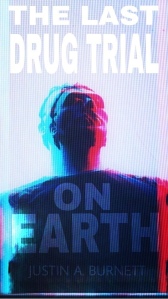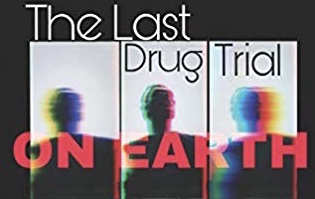Notes on an Essay Concerning Writing, Performing, and the Nature of Reality
by
Daulton Dickey.
[Author’s Note: This is an unfinished essay I vaguely remember writing, the result, I suspect, of having taken too many meds, which I do by accident from time to time.]
I.
My mind reels. Sometimes I lock myself in my head, in my world, and everything around me—my wife, my kids, my friends and job—vanish. Not literally. Figuratively. Everything slips into the background, sometimes into the deep background. Sometimes the universe transforms into background noise, a sort of visuospatial white noise. Other times, it disappears altogether.
I get so locked into my world, the world mutating and transmutating and exploding in my head, that the world and everything in it almost vanishes.
 A strange sensation: living in my head inside, then going outdoors and feeling as if the world itself is indoors, as if the world is a set constructed inside a planet-sized soundstage. Sometimes, when these sensations inundate me, I glance around—at the ground and the sky, cars and buildings and passersby—and marvel at the corporeality of it all. Of everything.
A strange sensation: living in my head inside, then going outdoors and feeling as if the world itself is indoors, as if the world is a set constructed inside a planet-sized soundstage. Sometimes, when these sensations inundate me, I glance around—at the ground and the sky, cars and buildings and passersby—and marvel at the corporeality of it all. Of everything.
On occasions, when I’m experiencing these sensations, I ask myself two questions, sometimes in conjunction, sometimes in disjunction:
What is imagination?
What is “reality”?
II.
So I’m sitting in a wheelchair on the corner of an intersection, wearing a plaid shirt, overalls, and sunglasses. I’m hunched over in the chair, not moving. Concentrating on steadying my breath, minimizing the expansion and contraction of my rib cage, trying to render it imperceptible.
Try it. It’s a fascinating study, something akin to sociology. People ignore you when you play dead. They amble or scurry past you. Some glance while others act as though they don’t see you. Some joke while others furrow their eyebrows.
I’d probably sell the death routine if “Staying Alive” by the Bee Gees wasn’t blasting from a speaker attached to my phone in my right pocket. (more…)







 Encountering lobster- or lizard-human hybrids occurs frequently when you’re an imagination masquerading as meat. I bumped into one or the other at least once a day; and whenever I do, they say, “Daulton, why do you insist on writing easy-to-read bestsellers?” To which I reply, “I am a professional. I go where the people lead me. If they want action, I give them action. If they want spiders hatching in their ears, I cultivate brown recluses on their behalf. If they want corpses to replace rain and blanket the city in a violent storm, then so be it.”
Encountering lobster- or lizard-human hybrids occurs frequently when you’re an imagination masquerading as meat. I bumped into one or the other at least once a day; and whenever I do, they say, “Daulton, why do you insist on writing easy-to-read bestsellers?” To which I reply, “I am a professional. I go where the people lead me. If they want action, I give them action. If they want spiders hatching in their ears, I cultivate brown recluses on their behalf. If they want corpses to replace rain and blanket the city in a violent storm, then so be it.”
 The state of popular fiction, especially mainstream “literary fiction,” in the second decade of the twentieth century is one of complacency and uniformity. It’s as though someone filtered the concept of fiction and literary fiction through a sieve, and homogeneity is all that largely remains.
The state of popular fiction, especially mainstream “literary fiction,” in the second decade of the twentieth century is one of complacency and uniformity. It’s as though someone filtered the concept of fiction and literary fiction through a sieve, and homogeneity is all that largely remains.
 The street kid has been a prominent metaphor throughout my fiction, and there is a reason for this. In fact one could argue, I am The Street Kid. I go by Phoenix, Phoenix The Street Kid, and this is because of the way that I have attached meaning to the idea of a street kid just trying to make it in the world, expressing their innocence and resourcefulness, just trying to survive. I have a very picaresque idea of the young homeless kid, and this has no doubt influenced my perception of the homeless and my writing. Serving those experiencing homelessness has also influenced my writing and vice versa. My writing and my life would be very different if I didn’t serve the homeless population.
The street kid has been a prominent metaphor throughout my fiction, and there is a reason for this. In fact one could argue, I am The Street Kid. I go by Phoenix, Phoenix The Street Kid, and this is because of the way that I have attached meaning to the idea of a street kid just trying to make it in the world, expressing their innocence and resourcefulness, just trying to survive. I have a very picaresque idea of the young homeless kid, and this has no doubt influenced my perception of the homeless and my writing. Serving those experiencing homelessness has also influenced my writing and vice versa. My writing and my life would be very different if I didn’t serve the homeless population. 






 A strange sensation: living in my head inside, then going outdoors and feeling as if the world itself is indoors, as if the world is a set constructed inside a planet-sized soundstage. Sometimes, when these sensations inundate me, I glance around—at the ground and the sky, cars and buildings and passersby—and marvel at the corporeality of it all. Of everything.
A strange sensation: living in my head inside, then going outdoors and feeling as if the world itself is indoors, as if the world is a set constructed inside a planet-sized soundstage. Sometimes, when these sensations inundate me, I glance around—at the ground and the sky, cars and buildings and passersby—and marvel at the corporeality of it all. Of everything.